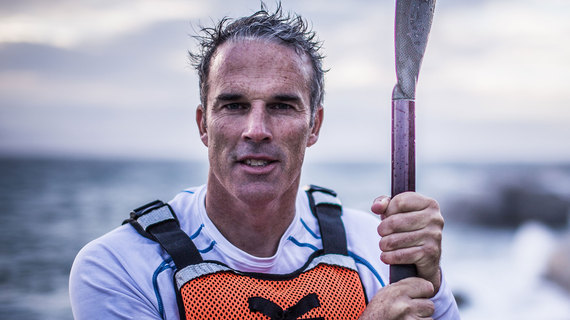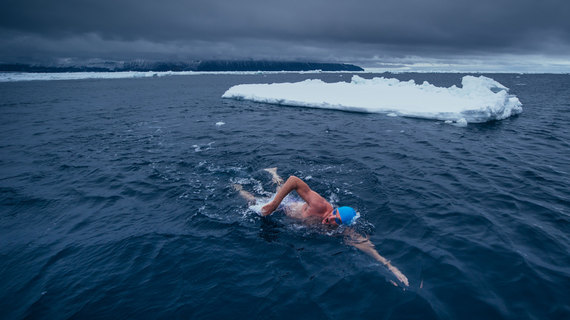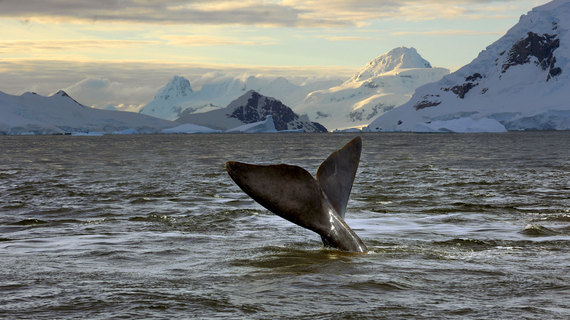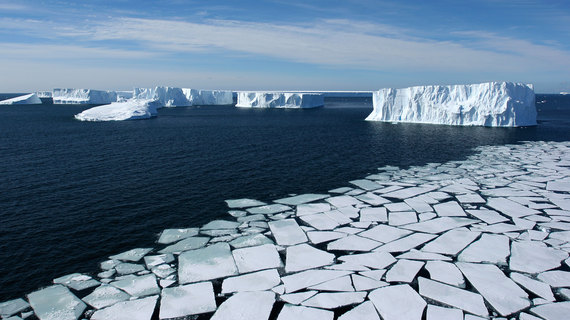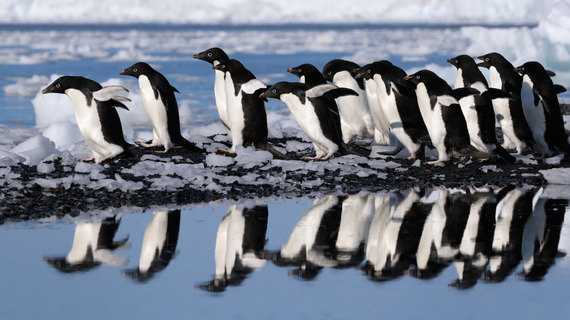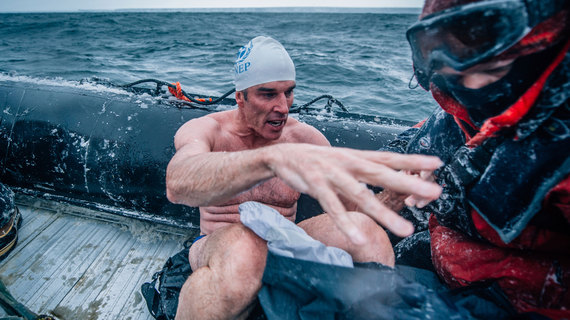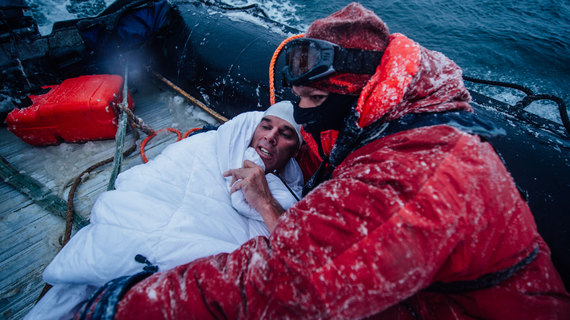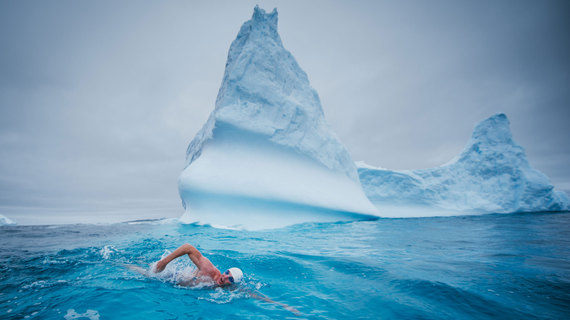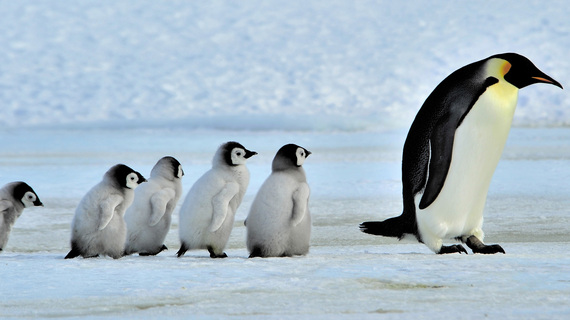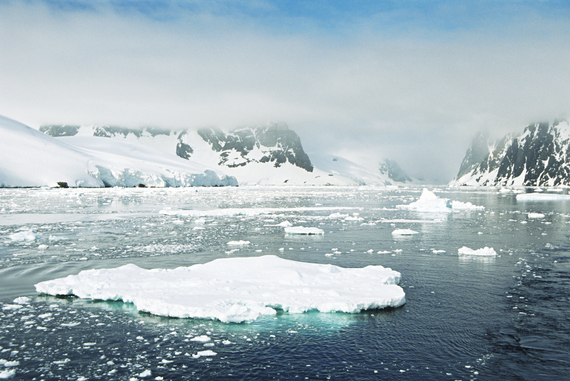On a mission to protect the Ross Sea, Lewis Pugh has been swimming in the most southerly water in the world: in the icy seas of Antarctica.
"It's so cold. It is unbelievably cold. When you're swimming in -1.7°C water, you're swimming in water 7°C colder than the waters in which the passengers of the Titanic perished."
Lewis Pugh is talking about the most southerly swim any person has ever completed, a record which he set wearing just a pair of Speedos in February as part of his Five Swims expedition. The former maritime lawyer tackled the series of 1km swims in Antarctica without a wetsuit or even a layer of goose fat in water that would kill most people within minutes.
Pugh isn't risking his life for records, although records are important to ensure media coverage. The waters in which he was swimming were those of the Ross Sea - and it is this sea that he is hoping to save.
He has made the challenge deliberately extreme. "You've got to get in there, you've got to immerse yourself. There's no good speaking about protecting the Ross Sea from London. It's got to be authentic. Be under no illusion, you take your life into your own hands when you dive into the Ross Sea," Pugh says.
A Polar Garden of Eden
So what makes the Ross Sea so important? "I think [the Ross Sea] is the most important sea in the world," answers Pugh, who is British, but spent most of his childhood years in South Africa. "It is the most pristine ecosystem left on this earth . . . it is invaluable to scientists."
Pugh describes the Ross Sea as the "Polar Garden of Eden". The area is home to numerous species, with 50% of the world's type C killer whales, nearly 40% of the world's Adélie penguins and 25% of the world's emperor penguins, all of which are fed by the sea's enormous plankton reserves. "It's a bit like the Serengeti of the oceans," Pugh comments. Aside from the most popular of Antarctic animals, the Ross Sea also hides incredible creatures, many of which are found nowhere else on Earth, such as the colossus squid, which dwells up to two kilometres under the surface.
The threats to this eco-system are mainly climate change and dramatic over-fishing, the latter of which is the biggest concern. One species under threat is the Antarctic tooth fish, which are caught and re-branded as Chilean sea bass in high-end restaurants in the US and the European Union. Pugh explains: "When you take out a species like that, which is a predator species, it's literally like taking sharks out of the world's oceans. The ecosystem collapses."
For the past four years, the 25 nations which regulate Antarctica have voted on whether to make the Ross Sea - an area the size of Britain, France and Germany - a Marine Protected Area (MPA), but it has to be a unanimous vote, and Russia and China have not yet voted in favour.
Our Blue Planet
Only about 2% of the world's oceans are protected - and water makes up 71% of planet Earth. "Between 150 and 100 years ago, we faced a similar situation on land and it was only because of very visionary men and women who set aside big chunks of terrestrial land as national parks that we were able to protect big areas of the world," Pugh says. "You imagine the world without the Serengeti or the Kruger National Parks or Yellowstone - that's what our oceans are like today."
It is for this reason that Pugh plunged into the icy waters of the Ross Sea. By creating a media buzz around his feats of incredible endurance, he hopes to encourage politicians to reconsider their stance on making the Ross Sea an MPA.
Swimming in Terrifying Conditions
For Pugh, the cause is infinitely more important than breaking records and he is at pains to spell out just how terrifying it is to swim in such hostile conditions.
He was faced with the question of when to throw in the towel on his most southerly swim in Antarctica in the Bay of Whales.
The air was so cold that the water froze when it left the sea. Pugh remembers seeing a wave break against the side of his support boat; the water hit the crew as ice.
"The wind was howling. The air temperature was -37°C. The water was -1°C. And somehow you've got to muster up the courage to get in there. You can't do that unless there is a burning reason. But equally you don't know what's going to happen. You don't know whether you're going to survive that swim. That's why it's terrifying. You don't know what's going to happen because no human has ever done a swim there before."
At 350 metres, he had to be hauled out because he'd lost all feeling in his fingers and to continue could have killed him. "There's a fine line between courage and foolhardiness, and that line lay at 350 metres," Pugh says. When I spoke to him, two months after his swim, he'd still yet regain feeling in two of his fingers.
Getting the Heart Right
So, how does Pugh prepare himself for such life-threatening conditions?
"You've obviously got to get your body right and that requires swimming for long periods of time in cold water. The body is an amazing thing. You can adapt your body to withstand cold water," he says.
Pugh's body has adapted in an extraordinary way: it heats his core temperature up by 1.2°C before he gets into the water, a phenomenon of which the cause is unknown. Pugh thinks it is a Pavlovian response to having swum in cold water for nearly 30 years.
Mental preparation is crucial:
"You've got to get your mind right. You've got to be very focused. You've got to dive in confidently. But the most important thing is to get the heart right and that means getting the reason why you're doing it right. If you don't have a reason, there is no way you'll get into that water, it's just too terrifying, and you certainly won't be able to stay in to complete a long-distance swim."
Pugh's reason is his overriding passion for the ocean. "I've spent my life in them," he says. "I love being in oceans . . . I feel at home. I've spent 27 years swimming in every ocean in the world and I've really seen them change."
Overfishing and Climate Change
The major change Pugh has seen in the oceans is overfishing. He recalls swimming to Robben Island from Cape Town as a boy and seeing penguins. Now, he says, you rarely see them: the population has decreased from 4 million in 1900 to 100,000 in 2000 and to 60,000 in the last 15 years. Penguins are indicator species and their numbers are telling of the amount of fish in the water.
Other changes he has seen are climate change - in retreating glaciers and melting sea ice - and plastic pollution everywhere. "It inspires me to get out there and keep on going," he says.
Back on Dry Land
Now that the Five Swims expedition is over, Pugh is shuttling back and forth between Washington D.C. and Moscow, where he has been engaged in "warm and constructive" talks ahead of October's vote to make the Ross Sea an MPA. Does he think he's found it easier to communicate with Russia because he's not a politician? Perhaps: "They told me that they trusted me because they said 'you've got no agenda'."
Pugh is optimistic, as you'd have to be when putting your life on the line for a cause. Although he speaks of the world having "sleep-walked" back into another Cold War, Pugh notes that in the height of the original Cold War "the continent of Antarctica was set aside as a place for peace and science." He's hopeful the same can be achieved with the oceans: "If we can break the political deadlock . . . it's an opportunity to build a bridge for peace."
If Pugh's extreme swimming reveals anything, it's the urgency of the situation. "Back in the early part of the century, when whaling was allowed down in Antarctica, over a period of just seven years between 1923 and 1930, every single blue whale was killed in the Ross Sea. What we know is when you do have unregulated fishing in a very short period of time you completely destroy an ecosystem."
"I did these swims to highlight the issue," he says. "We can't wait any longer for this Marine Protected Area in the Ross Sea."
